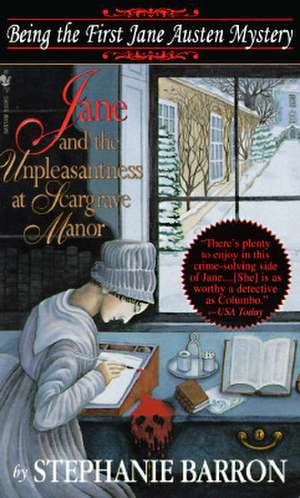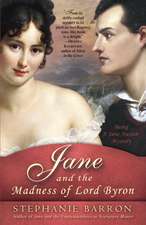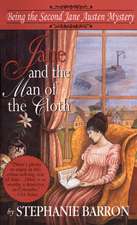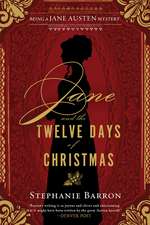Jane and the Unpleasantness at Scargrave Manor: Being the First Jane Austen Mystery: Jane Austen Mysteries, cartea 0001
Autor Stephanie Barronen Limba Engleză Paperback – 30 noi 1996
On a visit to the estate of her friend, the young and beautiful Isobel Payne, Countess of Scargrave, Jane bears witness to a tragedy. Isobel's husband—a gentleman of mature years—is felled by a mysterious and agonizing ailment. The Earl's death seems a cruel blow of fate for the newly married Isobel. Yet the bereaved widow soon finds that it's only the beginning of her misfortune...as she receives a sinister missive accusing her and the Earl's nephew of adultery—and murder. Desperately afraid that the letter will expose her to the worst sort of scandal, Isobel begs Jane for help. And Jane finds herself embroiled in a perilous investigation that will soon have her following a trail of clues that leads all the way to Newgate Prison and the House of Lords—a trail that may well place Jane's own person in the gravest jeopardy.
| Toate formatele și edițiile | Preț | Express |
|---|---|---|
| Paperback (2) | 48.25 lei 3-5 săpt. | |
| CRIMELINE – 30 noi 1996 | 48.25 lei 3-5 săpt. | |
| Bantam – 30 apr 2008 | 92.45 lei 3-5 săpt. | +38.82 lei 4-10 zile |
Preț: 48.25 lei
Nou
Puncte Express: 72
Preț estimativ în valută:
9.23€ • 9.67$ • 7.64£
9.23€ • 9.67$ • 7.64£
Carte disponibilă
Livrare economică 17-31 martie
Preluare comenzi: 021 569.72.76
Specificații
ISBN-13: 9780553575934
ISBN-10: 0553575937
Pagini: 352
Dimensiuni: 107 x 176 x 27 mm
Greutate: 0.17 kg
Ediția:Bantam Trade PB.
Editura: CRIMELINE
Seria Jane Austen Mysteries
ISBN-10: 0553575937
Pagini: 352
Dimensiuni: 107 x 176 x 27 mm
Greutate: 0.17 kg
Ediția:Bantam Trade PB.
Editura: CRIMELINE
Seria Jane Austen Mysteries
Notă biografică
Stephanie Barron is the author of eight previous Jane Austen mysteries. She lives in Colorado, where she is at work on the next Jane Austen mystery.
Extras
Journal entry, 11 December 1802, written in the small hours
"What do you make of it, Jane?" The Countess of Scargrave asked. Her fingers gripped my elbow painfully.
I gazed at the recumbent form of her husband with dismay. Frederick, Lord Scargrave, was decidedly unwell--so unwell that I had been called to his bedside an hour before dawn, an indiscretion the Earl would never have allowed while possessed of his senses. I pulled the collar of my dressing gown closer about my neck and placed my free hand over the Countess's.
"I believe that your husband is dying, Isobel," I told her.
Her fingers moved convulsively under my own, and then were still. "Dying. Were I to hear it so declared a thousand times, I still should not believe it possible."
I surveyed my friend with silent pity, uncertain how to answer such distress. The transformation wrought upon her husband's agonized countenance was indeed extraordinary--and had required but a few hours to effect. That very evening, the Earl had led his Countess down the dance in Scargrave's ballroom, revelling in the midst of a company come to toast the fortunes of them both. Despite his eight-and-forty years, he shone as a man blessed with second youth, elegant and lively, the very charm of his race crying out from every limb. And tho' he had complained of dyspepsia before, this illness came upon him of a sudden--and with a violence one may hardly credit to an overfondness for claret and pudding.
"Had he taken aught to eat or drink in the past few hours?" I asked.
My friend shook her head. "Only a milk toddy and some sweetmeats the maid brought to him upon retiring. But I do not believe he had long consumed them before the sickness laid him prostrate."
The stench of the Earl's illness rose from the fouled sheets the maids would not change for fear of paining him further. His breath was caught thick within his throat, and his strength worn down by dizzyness and a violence of puking such as one usually sees under the influence of a purgative. His eyes were rolled back in drowsy oblivion, his skin was pallid, and his features were bloated. It was a trial merely to observe such suffering; to endure it must have been fearsome.
As I watched with Isobel by his bedside, awaiting the doctor summoned in haste from London, the Earl gave forth a great moan, rose up shuddering from his sheets, and clutched his wife's hand. "Blackguards!" his shattered voice cried. "They would take me from within!" Then he fell back insensible upon his bed, and spoke no more.
Isobel was all efficiency; a compress she had in a moment, and ministered to her troubled lord, and the violence of feeling that had animated his poor body but an instant before, troubled him not again.
I am no stranger to death--I have sat watch over too many unlovely ends by the side of my clergyman father, who believes the company of a woman necessary to sustain him in the most mortal hours of his ministry--but this was a sort of dying I had never witnessed.
A chill draught wafted through the chamber door from the great hall below. I turned my head swiftly, in hope of the doctor, and saw only Marguerite, Isobel's maid.
"Milady," the Creole girl whispered, her eyes stealing from her mistress's face to the more dreadful one of the Earl, "the doctor is come." Her countenance was pale and frightened, and as I watched, she made the Papist sign of the cross hurriedly at her brow, and ducked back through the doorway.
I cannot find it in me to scold the maid for such foolishness. She is a simple girl from Isobel's native Barbadoes, who accompanied her mistress upon Isobel's removal to England two years ago. Marguerite has sorely missed her sleep tonight--it was she who fetched me hastily before dawn to the Countess's side. But even I, a child of cold-blooded England less susceptible to horrified fancy, must confess to sleeplessness these several hours past. For the Earl has uttered such moans and cries that none may shut out his agony, and all within Scargrave's walls are robbed of peace this night.
"Lady Scargrave," the physician said, breaking into my thoughts. He clicked his heels together and bowed in Isobel's direction. A young man, with all his urgency upon his face.
"Dr. Pettigrew," the Countess replied faintly, her hand going to her throat, "thank God you are come."
How Isobel could bear it! Married but three months, and to lose a husband one has but lately acquired would seem the cruellest blow of Fate. Yet still she stood, composed and upright, and waited with the terrible fortitude of women for the result of so much misery.
Dr. Pettigrew glanced at me and nodded, brushing the snow from his greatcoat and handing it to Marguerite, who bobbed a frightened curtsey and ducked out of the chamber. As the physician hastened to the Earl's bedside, I strove to read his thoughts; but his eyes were hidden behind spectacles, and his mouth held firmly in a line, and I could divine nothing from his youthful countenance. He reached for the Earl's wrist, and poor Lord Scargrave moaned and tossed upon his pillow.
"Leave us now, my dear Jane," Isobel said, her hand cool upon my cheek; "I will come to you when I may."
1. A brief explanation of English titles and modes of address may be helpful to American readers, who lack Jane's easy familiarity with both. Isobel Collins married Frederick Payne, the Earl of Scargrave, and as such became the Countess of Scargrave. She would be addressed as Lady Scargrave, but because she is a commoner by birth, she would never be addressed as Lady Isobel; that would be a courtesy title conferred on the daughter of a peer. The Earl is usually addressed as Lord Scargrave, taking his name from his title, rather than as Lord Payne, his family name, which in this account denotes his heir Fitzroy, Viscount Payne. --Editor's note.
"What do you make of it, Jane?" The Countess of Scargrave asked. Her fingers gripped my elbow painfully.
I gazed at the recumbent form of her husband with dismay. Frederick, Lord Scargrave, was decidedly unwell--so unwell that I had been called to his bedside an hour before dawn, an indiscretion the Earl would never have allowed while possessed of his senses. I pulled the collar of my dressing gown closer about my neck and placed my free hand over the Countess's.
"I believe that your husband is dying, Isobel," I told her.
Her fingers moved convulsively under my own, and then were still. "Dying. Were I to hear it so declared a thousand times, I still should not believe it possible."
I surveyed my friend with silent pity, uncertain how to answer such distress. The transformation wrought upon her husband's agonized countenance was indeed extraordinary--and had required but a few hours to effect. That very evening, the Earl had led his Countess down the dance in Scargrave's ballroom, revelling in the midst of a company come to toast the fortunes of them both. Despite his eight-and-forty years, he shone as a man blessed with second youth, elegant and lively, the very charm of his race crying out from every limb. And tho' he had complained of dyspepsia before, this illness came upon him of a sudden--and with a violence one may hardly credit to an overfondness for claret and pudding.
"Had he taken aught to eat or drink in the past few hours?" I asked.
My friend shook her head. "Only a milk toddy and some sweetmeats the maid brought to him upon retiring. But I do not believe he had long consumed them before the sickness laid him prostrate."
The stench of the Earl's illness rose from the fouled sheets the maids would not change for fear of paining him further. His breath was caught thick within his throat, and his strength worn down by dizzyness and a violence of puking such as one usually sees under the influence of a purgative. His eyes were rolled back in drowsy oblivion, his skin was pallid, and his features were bloated. It was a trial merely to observe such suffering; to endure it must have been fearsome.
As I watched with Isobel by his bedside, awaiting the doctor summoned in haste from London, the Earl gave forth a great moan, rose up shuddering from his sheets, and clutched his wife's hand. "Blackguards!" his shattered voice cried. "They would take me from within!" Then he fell back insensible upon his bed, and spoke no more.
Isobel was all efficiency; a compress she had in a moment, and ministered to her troubled lord, and the violence of feeling that had animated his poor body but an instant before, troubled him not again.
I am no stranger to death--I have sat watch over too many unlovely ends by the side of my clergyman father, who believes the company of a woman necessary to sustain him in the most mortal hours of his ministry--but this was a sort of dying I had never witnessed.
A chill draught wafted through the chamber door from the great hall below. I turned my head swiftly, in hope of the doctor, and saw only Marguerite, Isobel's maid.
"Milady," the Creole girl whispered, her eyes stealing from her mistress's face to the more dreadful one of the Earl, "the doctor is come." Her countenance was pale and frightened, and as I watched, she made the Papist sign of the cross hurriedly at her brow, and ducked back through the doorway.
I cannot find it in me to scold the maid for such foolishness. She is a simple girl from Isobel's native Barbadoes, who accompanied her mistress upon Isobel's removal to England two years ago. Marguerite has sorely missed her sleep tonight--it was she who fetched me hastily before dawn to the Countess's side. But even I, a child of cold-blooded England less susceptible to horrified fancy, must confess to sleeplessness these several hours past. For the Earl has uttered such moans and cries that none may shut out his agony, and all within Scargrave's walls are robbed of peace this night.
"Lady Scargrave," the physician said, breaking into my thoughts. He clicked his heels together and bowed in Isobel's direction. A young man, with all his urgency upon his face.
"Dr. Pettigrew," the Countess replied faintly, her hand going to her throat, "thank God you are come."
How Isobel could bear it! Married but three months, and to lose a husband one has but lately acquired would seem the cruellest blow of Fate. Yet still she stood, composed and upright, and waited with the terrible fortitude of women for the result of so much misery.
Dr. Pettigrew glanced at me and nodded, brushing the snow from his greatcoat and handing it to Marguerite, who bobbed a frightened curtsey and ducked out of the chamber. As the physician hastened to the Earl's bedside, I strove to read his thoughts; but his eyes were hidden behind spectacles, and his mouth held firmly in a line, and I could divine nothing from his youthful countenance. He reached for the Earl's wrist, and poor Lord Scargrave moaned and tossed upon his pillow.
"Leave us now, my dear Jane," Isobel said, her hand cool upon my cheek; "I will come to you when I may."
1. A brief explanation of English titles and modes of address may be helpful to American readers, who lack Jane's easy familiarity with both. Isobel Collins married Frederick Payne, the Earl of Scargrave, and as such became the Countess of Scargrave. She would be addressed as Lady Scargrave, but because she is a commoner by birth, she would never be addressed as Lady Isobel; that would be a courtesy title conferred on the daughter of a peer. The Earl is usually addressed as Lord Scargrave, taking his name from his title, rather than as Lord Payne, his family name, which in this account denotes his heir Fitzroy, Viscount Payne. --Editor's note.
Recenzii
"There's plenty to enjoy in this crime-solving side of Jane....[She] is as worthy a detective as Columbo." —USA Today
"Happily succeeds on all levels: a robust tale of manners and mayhem that faithfully reproduces the Austen style—and engrosses to the finish." —Kirkus Reviews
"Splendid fun!" —Star Tribune, Minneapolis
"Happily succeeds on all levels: a robust tale of manners and mayhem that faithfully reproduces the Austen style—and engrosses to the finish." —Kirkus Reviews
"Splendid fun!" —Star Tribune, Minneapolis
Descriere
Readers love her as an author, now they'll embrace her as the sleuth in Stephanie Barron's new mysteries. Not long after Jane Austen arrives at the estate of her friend, the Countess of Scargrave, her elderly husband, the Earl, succumbs to a mysterious illness. The widow then becomes the target of some sinister accusations. Jane attempts to get to the bottom of this complex puzzle, putting herself in the gravest jeopardy as she follows a trail of clues that leads all the way to the House of Lords.



















